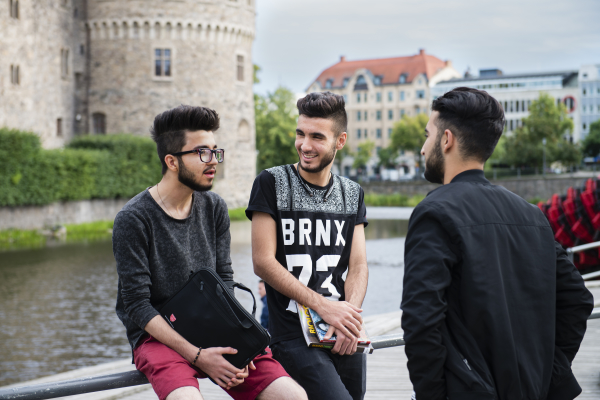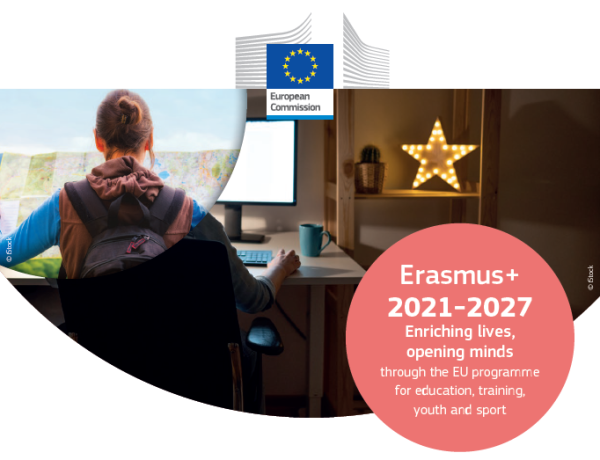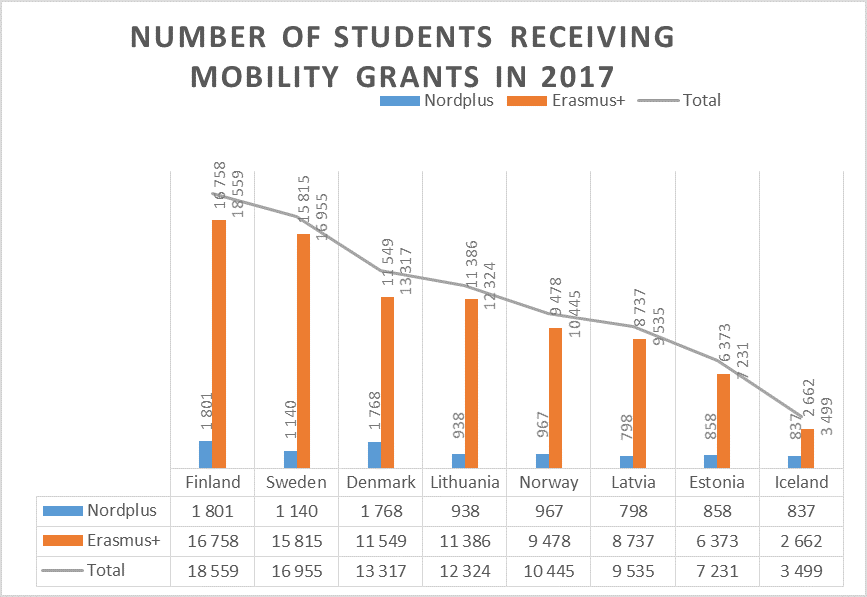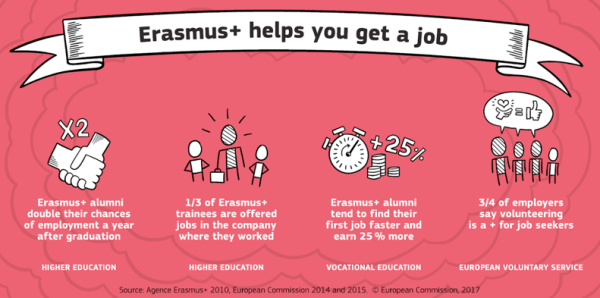Module 1: Why learning mobility
| Site: | Euroguidance Latvia Academy |
| Course: | Resource library on mobility guidance |
| Book: | Module 1: Why learning mobility |
| Printed by: | Guest user |
| Date: | Sunday, 15 February 2026, 9:18 AM |
Description
EXPECTED LEARNING OUTCOME: You will be able to argument how learning mobility can help your client group develop skills that are in demand on the labour market
1. What is learning mobility?

Free movement within the EU is one of the most appreciated results of European cooperation. Mobility of "learners" or students is not something new and the overall conclusion is that:
“Learning mobility has been found to be associated with benefits such as future mobility, higher earnings and lower unemployment. It improves transversal skills such as communication and foreign language skills that are key for an individual’s adaptation to the globalised economy and labour market. It is also believed to strengthen cultural awareness as well as citizenship competences. Student exchanges are assumed to positively influence the awareness of complex global issues and the civic skills of participants. Researchers have found that the experience of studying abroad can contribute to shifts in students’ beliefs, values and behaviours” (European Commision, Education and Training Monitor, 2018). *Editor's note: Education and Training Monitor, 2022 is available here or download a pdf.
This course focuses on shorter periods of learning mobility abroad as part of an education. The basic idea is that you go abroad for a period to study or practice after which you usually return with new skills and qualifications in your luggage.
**
2. Participation in learning mobility
 In 2019, 17 million Europeans lived or worked in a country other than that of their nationality, i.e., almost 3% of the European population. In addition to that, the number of students who study in another country was around 1.3 million, or 23% of the total student population.
In 2019, 17 million Europeans lived or worked in a country other than that of their nationality, i.e., almost 3% of the European population. In addition to that, the number of students who study in another country was around 1.3 million, or 23% of the total student population.The Erasmus+ programme (and various other European programmes before that), provides financial support towards learning mobilities. In 2021 a new seven year’s programme commenced, with the staggering total budget of 26.2 billion €, with many new opportunities for the entire education sector. The main changes are:
- The possibility of student exchange both in primary and secondary school, in the same way as for university students.
- Small-scale partnerships where at least two organisations, from at least two program countries, can work together to increase the quality of their activities. Such a partnership can, for example, focus on the development of guidance practices. The idea is to make Erasmus + available to small-scale players with limited organisational capacity.
- In addition to physical mobility, virtual learning has been introduced and in e.g. higher education a so-called blended mobility is launched, where students can combine a shorter mobility period (5-30 days) with a virtual component.
- Being able to apply for accreditation is a novelty for institutions that allows for more long-term planning and makes it easier to handle applications for mobility from their students and staff.
An inclusion and diversity strategy is one of the priorities of the new Erasmus+ programme and the goal is to better reach out to more participants with fewer opportunities. The goal of this priority is to include individuals who would not otherwise participate and let everyone take advantage of the programme's opportunities. Barriers that can hinder participation can do so alone or as a combination of various factors such as:
- Disabilities and health problems (physical, mental, intellectual, or sensory)
- Barriers linked to education and training systems (early school-leavers, NEETs, and low-skilled adults)
- Cultural differences (migrants and refugees, people belonging to a national or ethnic minority, sign language users etc.)
- Social barriers (social marginalisation and/or family circumstances)
- Economic barriers (economic disadvantage or lack of support)
- Barriers linked to discrimination (a combination of two or several of these barriers: gender, age, ethnicity, religion, beliefs, sexual orientation, disabilities, or intersectional factors)
- Geographical barriers (remote or rural /peripheral areas, urban suburbs, less serviced areas or less developed areas in third countries)
Environment and climate action is another priority. This means that projects that raise awareness of climate change are encouraged, environmentally friendly travel is promoted and virtual mobility opportunities are provided as alternatives to physical mobility.
"People from the Nordic/Baltic countries also have access to funding for studies or work placements abroad through the Nordplus programme. In 2018, almost 9.500 people were granted such support."
In the Nordic/Baltic countries, the number of participants in Nordplus mobilities varied among countries.
The figure below shows the number of students from the Nordic/Baltic countries at all levels of education receiving mobility grants in 2017.

Source: Erasmus+ and Nordplus data, compiled by Euroguidance Latvia
**
3. Skills gained by learning abroad
 For guidance professionals, one of their most important roles when guiding students towards a mobility period, can be to help the students find some answer to the simple question “why should I study abroad? ” Skills such as language skills, cultural knowledge and tolerance have often been understood to be typical competences that students will gain while studying abroad. The longer they stay in a particular country, the more they are likely to develop these competences. Other skills such as productivity, resilience and curiosity have also come to light as skills these students are likely to gain as well, often without noticing it. Guidance professionals can help identify these skills and make them visible.
For guidance professionals, one of their most important roles when guiding students towards a mobility period, can be to help the students find some answer to the simple question “why should I study abroad? ” Skills such as language skills, cultural knowledge and tolerance have often been understood to be typical competences that students will gain while studying abroad. The longer they stay in a particular country, the more they are likely to develop these competences. Other skills such as productivity, resilience and curiosity have also come to light as skills these students are likely to gain as well, often without noticing it. Guidance professionals can help identify these skills and make them visible.
3.1. Intercultural understanding
The development of intercultural competences does not happen automatically just by living abroad for a while, it is necessary to guide students towards actively developing these skills before, during and after their study period. Guidance practitioners can assist them by pointing out:
Language preparations. Students’ language capacity can be different and therefore their need for preparation also differs. Students who can understand the language of the area they plan to visit and express themselves to some degree, gain much more from the mobility than those who have fewer skills. The European Council has developed a self-assessment tool where people can assess how much they understand and can make use of different languages. This is a valuable tool to use before starting off. It can also be very useful for students to bring with them a glossary of the most common professional vocabulary or the link to websites where they can look them up.
Cultural preparations. Students should be encouraged to read as much reliable material as possible about their host country before going there. This could include the geography and history of the country, common traditions and blogs from former students. They may also benefit from watching videos from the country to gain an impression of what it looks like and how its citizens lead their lives. While there, they should also be encouraged to visit museums, go to concerts or participate in local activities, in order to gain an even better cultural knowledge.
Tolerance. It may be necessary to point students’ attention to the aspect of tolerance towards “different” people before they travel abroad for studies. In addition to being tolerant towards “similar people”, the students need to take a similar position towards people of different ethnic backgrounds, religions or cultural traditions. They need to remember that they are the guests and need to be very polite and careful when criticising something.
3.2. Future employment
 Student mobility is seen by the European Commission as one of the solutions to address the skills gap in Europe: “Increasing the mobility of students and graduates may be crucial to developing Europe’s skilled labour force in order to strengthen its position as a knowledge-based economy. The literature argues that competition for global talent has become a vital route to enriching the stock of human capital available in a country. Student mobility is one of the options for attracting this global talent, under the ‘academic-gate approach’. This is aimed at drawing from the pool of foreign students, having them graduate from local educational institutions and encouraging them to stay and work afterwards in the destination country.” (European Commission, Education and Training Monitor 2018).
Student mobility is seen by the European Commission as one of the solutions to address the skills gap in Europe: “Increasing the mobility of students and graduates may be crucial to developing Europe’s skilled labour force in order to strengthen its position as a knowledge-based economy. The literature argues that competition for global talent has become a vital route to enriching the stock of human capital available in a country. Student mobility is one of the options for attracting this global talent, under the ‘academic-gate approach’. This is aimed at drawing from the pool of foreign students, having them graduate from local educational institutions and encouraging them to stay and work afterwards in the destination country.” (European Commission, Education and Training Monitor 2018).
As the 2019 article "Developing Guidance Competences for Learning Mobility" (Launikari et al, 2020) sums up:
"Evidence also shows that studying and living abroad positively affects individuals’ future career opportunities and makes them readier to work in an internationally competitive labour market than non-mobile young people. Other studies suggest that individual motivation and readiness for overseas studies, intercultural learning and skills development while living abroad may benefit individuals’ employment.”
Moreover, individuals with international experience tend to run a reduced risk of long-term unemployment, earn higher salaries and have more responsibility in their professional lives than those without it. For example, Swedish exchange students are employed and integrated in the labour market to a greater extent and have higher average income than those who have studied only in Sweden.
4. Future development of mobility
 The future of education in the EU is being debated with the goal to achieve a common European Education Area by 2025. The European Commission proposes to make international mobility truly accessible for all by increasing participation in the Erasmus + programme and by creating a European student card.
The future of education in the EU is being debated with the goal to achieve a common European Education Area by 2025. The European Commission proposes to make international mobility truly accessible for all by increasing participation in the Erasmus + programme and by creating a European student card.
Another proposal to support mobility for learning and working purposes is the mutual recognition of diplomas worldwide. The Council of the European Union has adopted a recommendation "to promote automatic mutual recognition of qualifications in higher education and upper secondary education and the results of study periods abroad" (2018 / C 444/01) and UNESCO Member States the United Nations Convention on Higher Education. This establishes universal principles for the recognition of studies and degrees and is said to be able to improve the mobility of the more than 220 million students enrolled in higher education worldwide.
A further aspect is language learning. In 2018, a recommendation for improved language learning in Europe was adopted. It applies from an early age and provides a common benchmark for language proficiency in high school (mother tongue + two other languages before 2025).
The European Commission's mobility initiatives also include several specialised networks – among them Europass, Eurodesk, EURES and Euroguidance. The European qualifications framework known as EQF, aims at making qualifications more transparent. Euroguidance can help answer difficult questions about studying abroad, help network with guidance professionals in another country or gain insight into the development of lifelong guidance / career guidance in Europe.
Euroguidance has contact points in 34 countries and guidance professionals are welcome to them for further information. Contact information is available on the network's website www.euroguidance.eu.
4.1. Sustainable travel
 Being environmentally friendly can be difficult on the road and may require some planning both before and during the journey. An important question is how often you travel and where. Flying to Asia once every five years can be more sustainable than flying on several shorter trips within Europe per year. What is important here is to make a conscious decision.
Being environmentally friendly can be difficult on the road and may require some planning both before and during the journey. An important question is how often you travel and where. Flying to Asia once every five years can be more sustainable than flying on several shorter trips within Europe per year. What is important here is to make a conscious decision.
In Erasmus+, additional grants are awarded to participants who choose a green travel option, eg. by taking the train or sharing a car, for the longest part of their journey. Travelling sustainably also means having a holistic view, not only focusing on transport, but also on the choice of accommodation, food and what you choose to do during your stay abroad in general. Lonely planet has collected tips on how to go green when travelling.
Take the train
If you travel within the Nordic countries or Europe, you can in many cases travel by bus or train. Train companies are working to make it easier to travel with train across borders and interrail cards are available in many countries: https://www.interrail.eu/en
Film: Uppsala University was elected Erasmus + actor of the year in 2019. Here, Sara Laginder, who is responsible for Erasmus at the university, talks about how they promote train travel among students:
4.2. Blended mobility
 Blended mobility is a combination of physical mobility with collaborative online learning, exchange and teamwork.
Blended mobility is a combination of physical mobility with collaborative online learning, exchange and teamwork.
Blended mobility might become more popular in the future due to various physical mobility restrictions related to COVID, but also for environmental reasons. Below are excerpts from the new Erasmus+ programme guide (2021-2027) relating to higher education:
- Any study period or traineeship abroad of any duration, including doctoral mobility, may be carried out as a blended mobility. Blended mobility is a combination of physical mobility with a virtual component facilitating a collaborative online learning exchange and teamwork. For example, the virtual component can bring learners together online from different countries and study fields to follow online courses or work collectively and simultaneously on assignments that are recognised as part of their studies (Erasmus+ Programme Guide, pp. 45).
- The institutions should promote blended mobility (...) within their institution to offer more flexible mobility formats and further enhance the learning outcomes and impact of physical mobility (Erasmus+ Programme Guide, pp. 44).
- Any student, in particular those who are not able to participate in a long-term physical mobility for studies or for traineeships, may combine a shorter physical mobility with a virtual component. In addition, any student may participate in blended intensive programmes. In these cases, physical mobility must (…) be combined with a compulsory virtual component facilitating collaborative online learning exchange and teamwork (Erasmus+ Programme Guide, pp. 49).
5. MODULE 1: KEY POINTS TO REMEMBER

Participation in learning mobility
- The Erasmus+ programme provides financial support for learning mobilities.
- Inclusion is one of the priorities for the new Erasmus+ and the goal is to include individuals who would not otherwise participate. Environment and climate action is another priority.
- People from the Nordic/Baltic countries also have access to funding for studies or work placements abroad through the Nordplus programme.
Skills gained by learning abroad
- Language skills, cultural knowledge and tolerance have often been understood to be typical competences that students will gain while studying abroad.
- Productivity, resilience and curiosity have also come to light as skills these students are likely to gain, often without noticing it. Guidance professionals can help the students identify these skills and make them visible.
- The development of intercultural competences does not happen automatically just by living abroad for a while, it is necessary to guide students towards actively developing these skills before, during and after their study period.
- Students who can understand the language of the area they plan to visit and express themselves to some degree, gain much more from the mobility than those who have fewer skills.
- Students should be encouraged to read as much reliable material as possible about their host country before going there.
- It may be necessary to point students’ attention to the aspect of tolerance towards “different” people before they travel abroad for studies.
Future employment
- Increasing the mobility of students and graduates may be crucial to developing Europe’s skilled labour force in order to strengthen its position as a knowledge-based economy.
- Studying and living abroad positively affects individuals’ future career opportunities and makes them readier to work in an internationally competitive labour market than non-mobile young people.
- Individuals with international experience tend to run a reduced risk of long-term unemployment, earn higher salaries and have more responsibility in their professional lives than those without it.
Future development of mobility
- The European Commission proposes to make international mobility truly accessible for all by increasing participation in the Erasmus + programme and by creating a European student card.
- In Erasmus+, additional grants are awarded to participants who choose a green travel option.
- Travelling sustainably also means having a holistic view, not only focusing on transport, but also on the choice of accommodation, food and what you choose to do during your stay abroad in general.
- Blended mobility is a combination of physical mobility with collaborative online learning, exchange and teamwork.
- Students who are not able to participate in long-term physical mobility may combine a shorter physical mobility with a virtual component.